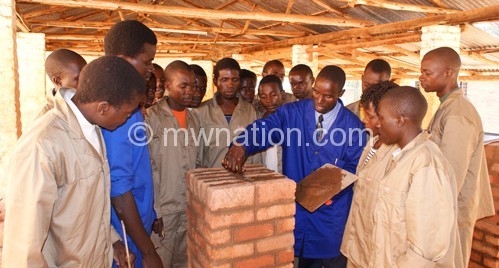Teveta embarks on a business re-engineering path

It is the desire of every business to be a market leader in its sector of operation. This spirit also goes on among individuals who seek to go to the top of whatever endeavour they undertake in their daily lives.
To rise to the pinnacle and achieve desired goals, performance assessments are crucial. In many organisations, such assessments take the form of individual performance appraisals.
Besides, the responsible officers also assess the performance of their business in general to see whether they are moving forward. Such soul-searching initiatives require organisations to carry out Swot analyses, honestly assessing their strengths, weaknesses, opportunities and threats.
Perhaps in the same spirit, the Technical, Entrepreneurial and Vocational Education and Training Authority (Teveta) has developed a strategic plan launched late last year to run from 2013 to 2018.
Teveta board chairperson the Reverend Osborne Joda-Mbewe described the strategic plan as an initiative undertaken to reinforce the transformation of the Teveta to effectively respond to new realities and opportunities prevailing in the country and beyond.
He said: “The strategic plan maps out a commitment towards the provision of high quality Tevet programmes that are demand-driven and relevant to the development needs of the nation.
“The strategic planning process provided the core thrust of realising what Tevet Authority is, the ability of its staff to think and reflect, to understand the past and create the future after scanning the current situation.
“Thus, the strategic plan is the crystallisation of aspirations to meet the hopes and needs of the nation.”
In an executive summary to the strategic plan, former Teveta executive director Yusuf Alide said through the new road map, Teveta recognises the importance of entrepreneurship, research and development, private and public partnership and appropriate technology.
Apparently, according to Alide, the motivation is directed on empowerment of various stakeholders who for the past 12 or so years have remained on the peripheral of the regulated Tevet sector.
The plan has been laid out based on five pillars to reflect the backbone to the programme design and effective implementation. The pillars are: Access and equity; quality and relevance; governance and management and cross–cutting Issues.
These pillars are anchored on a number of goals and objectives of which the objective is to ensure an adequate and competitive workforce for export-led socio-economic growth of Malawi.
Malawi, which will be celebrating 50 years of independence on July 6 this year, has failed to develop a significant manufacturing base, relying heavily on tobacco for her exports. Tobacco is said to contribute about 60 percent of total foreign exchange earnings.
In recent years, the mining sector has been developed with Paladin Africa Limited’s Kayelekera Uranium Mine in Karonga as the biggest investment so far in operation. Several other investors are also exploring for various minerals.
In 2004, upon assuming the presidency, former president the late Bingu wa Mutharika unveiled a dream that sought to widen Malawi’s export base, thereby improving availability of foreign exchange, among others. The policy initiative sought to transform Malawi from a predominantly importing and consuming economy to a predominantly producing and exporting one.
However, many initiatives developed to facilitate achievement of such goals have failed to materialise.
But through the pillars in its strategic plan, Teveta argues that it is responding to the country’s mid-term plan—the Malawi Growth and Development Strategy II (MGDS II)—and the National Export Strategy (NES) to improve productivity of the Malawian workforce.
Said Joda-Mbewe: “We believe that partnership and participation of various stakeholders in this campaign will help Tevet Authority prepare the required skilled and knowledgeable Malawian society capable of sustainably and effectively contribute to development of our mother Malawi.”
Teveta was founded to regulate the provision of technical, entrepreneurial and vocational education training in the country. Over the years, thousands of people have graduated from Teveta programmes and Joda-Mbewe says the strategic plan is an effort in the long process of business re-engineering focusing on current systems and operations on the journey of self-examination and self-transformation.




